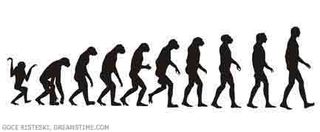Evolution

Evolution is among the most substantiated concepts in science and is the unifying theory of biological science. Charles Darwin co-originated, with Alfred Russel Wallace, the theory of evolution by natural selection. His masterwork, the 1859 "Origin of Species," offered ample evidence for evolution having occurred, as well as the first strong explanation for its mechanism, natural selection. Modern evolutionary theory incorporates these concepts: species change over time; genetic mutations are responsible for the changes; individuals with beneficial genetic mutations will survive preferentially compared with their competitors, in a process known as natural selection; those successful individuals' more numerous offspring will spread the beneficial genetic constructs throughout the population; when enough genetic changes reproductively isolate a population, that population has become a new species. Here you'll find news and information on evolution and the battle with proponents of so-called creation science.
Latest about Evolution

Why can't we smell ourselves as well as we smell others?
By Amanda Heidt published
It isn't true that we can't smell ourselves, although we do become habituated to our own scent.

Are legs more important than arms?
By Kiley Price published
Whether arms or legs are more important depends on the species and the environment.

Invisible barrier that runs through Indonesia finally explained by scientists
By Harry Baker published
Researchers now understand why there is an uneven distribution of animal species on either side of the mysterious boundary, known as the Wallace Line.

Did the Cambrian explosion really happen?
By Amanda Heidt published
Something unique does seem to have taken place during this time when so many animal groups first appeared, but it's not an open-and-shut case.

Weirdo blinking fish could hold the secrets to how our ancestors evolved to live on land, new study reveals
By Ben Turner published
The bulbous-eyed mudskipper could offer key clues about how our fishy ancestors first made the leap to land.

What energy source sparked the evolution of life?
By JoAnna Wendel published
Leading theories suggest that the first energy used by life was either from the sun or from geothermal heat and chemistry at the bottom of the ocean.

Which came first: The chicken or the egg?
By Joanna Thompson published
Most biologists will answer confidently when asked "which came first, the chicken or the egg?" but the answer may depend on what type of egg you're talking about.

Does evolution ever go backward?
By Michael Dhar published
In regressive evolution, organisms lose complex features and can appear to evolve "in reverse." But evolution doesn't retrace its steps, experts said.
Sign up for the Live Science daily newsletter now
Get the world’s most fascinating discoveries delivered straight to your inbox.
